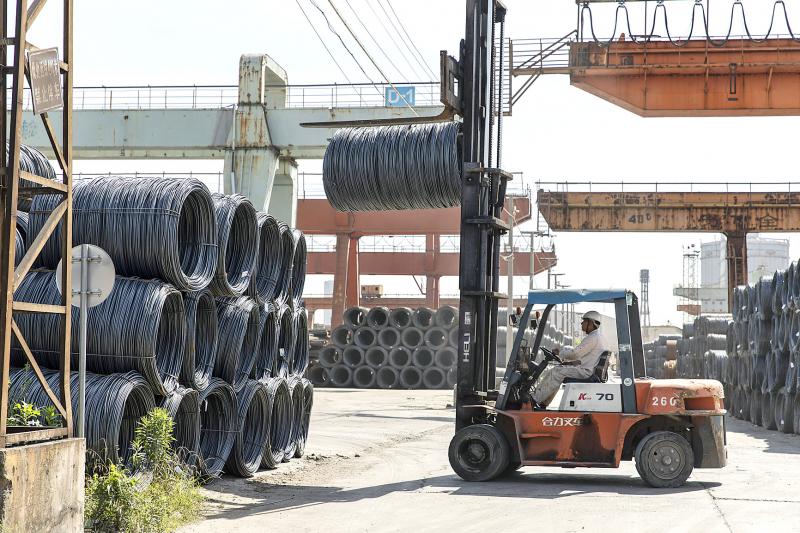China’s imports last month grew at their fastest pace in 10 years, fueled by surging demand for raw materials, although export growth slowed more than expected, weighed by disruptions caused by COVID-19 cases at the nation’s major southern ports.
While a brisk recovery in developed markets has bolstered demand for Chinese products, a global semiconductor shortage, higher raw material and freight costs, logistics bottlenecks and a strengthening yuan have dimmed the outlook for the world’s largest exporting nation.
China’s exports in US dollar terms grew 27.9 percent last month from a year earlier, slower than the 32.3 percent growth reported in April and missing analysts’ forecast of 32.1 percent.

Photo: Bloomberg
“Exports surprised a bit on the downside, maybe due to the COVID cases in Guangdong Province, which slowed down the turnover in Shenzhen and Guangzhou ports,” Pinpoint Asset Management Ltd chief economist Zhang Zhiwei (張智威) said, adding that turnover at ports in Guangdong is likely to remain slow this month.
Major shipping firms warned clients of worsening congestion at Shenzhen’s Yantian port in Guangdong Province after the discovery of several cases among port staff.
On the ground in Guangdong, factories have yet to report widespread capacity cuts over the outbreak, but admitted efficiency issues as they tried to meet overseas demand.
Chen Linsheng, chief operating officer at Anlan (安蘭), a Shenzhen-based manufacturer of skincare and beauty-care devices, said while there was no impact on production, staff are now subject to a series of COVID-19 tests and not allowed back into the factory without a negative result.
“We are not allowed going out [of the city]. We need to report in advance and cannot even go to Guangzhou or Foshan on our own,” Chen said, adding that a lot of meetings have moved back online.
Besides the impact of COVID-19 cases in Guangdong, the global chip shortage has started to hit all of China’s export items related to semiconductors, ING Bank NV chief economist for Greater China Iris Pang (彭藹嬈) said.
For example, auto processing products and parts, the biggest export item, fell 4 percent year-on-year, she said.
At the same time, the Chinese currency’s extended rally in the past few weeks to near three-year highs against the US dollar could further saddle US consumers with higher prices.
Imports increased 51.1 percent year-on-year last month in US dollar terms, the fastest growth since January 2011.
However, that figure — a gauge of import value, not volume — was partly flattered by hot raw materials prices with demand for commodities such as coal, steel, iron ore and copper driven by easing pandemic lockdowns in many countries and ample global liquidity.
Capital Economics Ltd senior China economist Julian Evans-Pritchard said while import prices increased at a rapid pace, import volume probably edged down last month.
“Once again, supply constraints are partly to blame – inbound shipments of semiconductors continued to drop back,” he said. “So too did imports of industrial metals.”
China posted a US$45.53 billion trade surplus for the month, wider than the US$42.86 billion surplus in April.

South Korea’s equity benchmark yesterday crossed a new milestone just a month after surpassing the once-unthinkable 5,000 mark as surging global memory demand powers the country’s biggest chipmakers. The KOSPI advanced as much as 2.6 percent to a record 6,123, with Samsung Electronics Co and SK Hynix Inc each gaining more than 2 percent. With the benchmark now up 45 percent this year, South Korea’s stock market capitalization has also moved past France’s, following last month’s overtaking of Germany’s. Long overlooked by foreign funds, despite being undervalued, South Korean stocks have now emerged as clear winners in the global market. The so-called “artificial intelligence

NEW IDENTITY: Known for its software, India has expanded into hardware, with its semiconductor industry growing from US$38bn in 2023 to US$45bn to US$50bn India on Saturday inaugurated its first semiconductor assembly and test facility, a milestone in the government’s push to reduce dependence on foreign chipmakers and stake a claim in a sector dominated by China. Indian Prime Minister Narendra Modi opened US firm Micron Technology Inc’s semiconductor assembly, test and packaging unit in his home state of Gujarat, hailing the “dawn of a new era” for India’s technology ambitions. “When young Indians look back in the future, they will see this decade as the turning point in our tech future,” Modi told the event, which was broadcast on his YouTube channel. The plant would convert

‘SEISMIC SHIFT’: The researcher forecast there would be about 1.1 billion mobile shipments this year, down from 1.26 billion the prior year and erasing years of gains The global smartphone market is expected to contract 12.9 percent this year due to the unprecedented memorychip shortage, marking “a crisis like no other,” researcher International Data Corp (IDC) said. The new forecast, a dramatic revision down from earlier estimates, gives the latest accounting of the ongoing memory crunch that is affecting every corner of the electronics industry. The demand for advanced memory to power artificial intelligence (AI) tasks has drained global supply until well into next year and jeopardizes the business model of many smartphone makers. IDC forecast about 1.1 billion mobile shipments this year, down from 1.26 billion the prior

People stand in a Pokemon store in Tokyo on Thursday. One of the world highest-grossing franchises is celebrated its 30th anniversary yesterday.